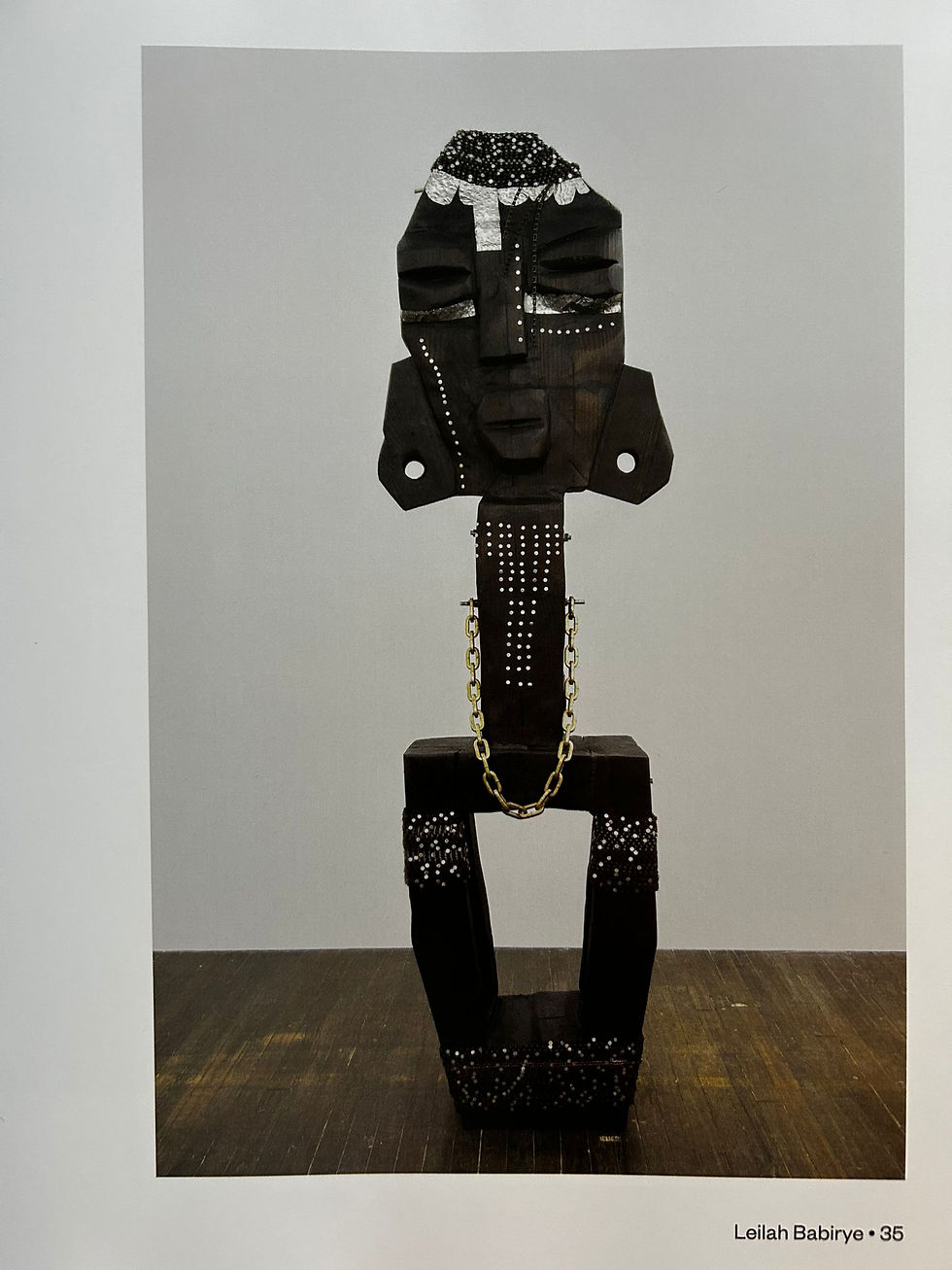African Art Now
- Madeleina Kay
- Jan 1
- 4 min read
I picked up 'African Art Now - Fifty Pioneers Defining African Art for the Twenty-First Century' from the book stall at my university. I wanted to highlight some of the artists and works which I found particularly interesting or provide some understandign which can inform my creative practice - especially with regards to my project researching migrant identities:
Leilah Babirye
Born in 1985, Kampala, Uganda; lives and works in Brooklyn, USA.
'In her densely layered sculptures, Leilah Babirye transforms unwanted materials into monuments to the resilience of queer communities.... Commenting on the histories and traditions of her country, where queer people are commonly referred to as ebisiyaga (rubbish), her choice of material is more than a conceptual or economical strategy; Babirye creates beauty out of what society has deemed unworthy... Often appearing raised on plinths, Babirye's sculptures celebrate the lives of those who have been rejected by society. Her love for these individuals is what brings the scultptures to life'; each queen stands for a community whose stories of joy, struggle and resistance deserve to be honoured.'.

Joana Choumali
Born in 1974 in Abidjan, Côte d'Ivoire; lives and works in Abidjan.
'Honouring Africa's histories and traditions, Choumali's work is driven by a desire to represent the hybridity of cultures across the continent. In her 2013-14 series Hââbré/The Last Generation, she explores the significance of scarification through headshot portraits of Burkinabe men and women who emigrated to Côte d'Ivoire from the neighbouring country of Burkino Faso. Once a marker of culture and religious identity, the practice of making incisions to pattern the skin is slowly disappearing due to pressure from religious and state authorities.'

Ibrahim Mahama
Born in 1987 Tamale, Ghana; lives and works in Tamale.
'MIbrahim Mahama transforms common materials in order to examine the politics of migration and capital in a global society... In his work Non-Orientable Nkansa II. 1901-2030 (2016) he engaged with a network of collaborators to produce shoemaker boxes... Obtained through a process of negotiation and exchange with the boxes' former owners, Mahama reimagines an economy of circulation in which the boxes are not discarded once worn out, but reconstructed as objects of value.'
'I am an interested in how crisis and failure are absorbed into this material with a strong reference to global transaction and how capitalist structures work.'

Serge Alain Nitegeka
Born in Rwanda in 1983; lives and works in Johannesburg, South Africa.
'Upon first impressions, Sergei Alain Nitegeka's installations and paintings appear to be purely abstract, concerned with line, colour and space. However, the works are deeply symbolic, conforonting the viewer with issues of forced migrationand a world divided by impenetrable borders and invisible frontiers... In obstacle 1 (2012), a series of intersecting planks and trusses form barriers and entry points that converge at various points. Forcing viewers to manoeuvre themselves through the work with difficulty, the installation imposes feelings of displacement associated with migratory experiences of fracture and adaptation that come with the constant negotiations of survival.'

Emeka Ogboh
Born in 1977 in Enugu, Nigeria; lives and works in Lagos, Nigeria, and Berlin, Germany.
'In Market symphony (2016), Ogboh honours the city's informal, open markets that are under threat from a government eager to profit from shiny new shopping complexes catering to a privileged few. The installation captures the sounds of the traditional vegetable traders, shoeshiners and fabric sellers who are part of the social tapestry of the city, with speakers inserted into colourful trays used to store food and display goods. The markets as a space of flux is also at the centre of the installation The Way Earthly Things Are Going (2017), which featured the Greek song of lamentation, 'When I forget, I'm glad', played over a rolling LED display of stock market indexes. Evoking the precariousness of the global economy, the artwork captures the confrontation between soulless statistics and the human lives disrupted by the global financial crisis of 2007-8, and its lasting impact.'

Zohra Opoku
Born in 1976, Altdöbern, Germany; lives and works in Accra, Ghana.
'In Oppoku's work, clothes and textiles carry multiple meanings; they are a marker of individual identity and yet a symbol of collective knowledge, both a global commodity and a private possession... By weaving the narrative of her life into her practice, Opoku's work is a constant reflection on the experiences that have hsaped her.'

Athi-Patra Ruga
Born in 1984 in Mthata, South Africa; lives and works in Cape Town and Johannesburg, South Africa.
'In Athi-Ptra Ruga's world of glamour and abundance, characters forge new identities in order to navigate legacies of colonialism and oppression... Growing up during the transition from apartheid to democracy, the dream of Nelson Mandela's rainbow nation loomed promisingly over Ruga's childhood. As a queer person of colour, however, Ruga was soon confronted with the growing violence towards women and the LGBTQI+ communities in his country.'

Billie Zangewa
Born in 1973 in Blantyre, Malawi; lives and works in Johannesburg, South Africa.
'In her autobiographical approach to storytelling, Billie Zawenga's silk tapestries carry tales of family life, romantic relationships and occasional moments of solitude amid the chaos of modern life. While the everyday events she depicts may appear mundane, her work speaks to the fundamental importance of women's work and feminist perspectives in a world where societies have been shaped by long-standing inequalities. With her labour-intensive process of hand-stitching, Zangewa consciously builds on traditions of textile production rooted in centuries-old skills passed down through generations.'


Comments